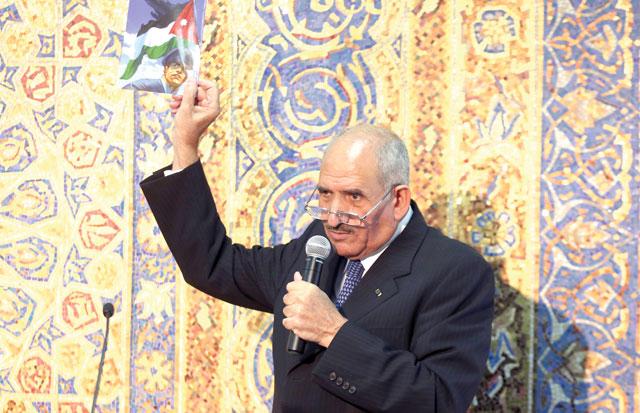You are here
Curricula controversy ‘used to pursue personal agendas’ — Thneibat
By Laila Azzeh - Oct 08,2016 - Last updated at Oct 08,2016

A photo released by the Education Ministry shows a private school bus purportedly used to shuttle public school students to the site of a protest against the ministry late last month (Photo courtesy of Education Ministry)
AMMAN — Controversy over recent curricular amendments “gave the opportunity to many to ride the wave in order to serve their personal agendas”, Education Minister Mohammad Thneibat said on Saturday.
Furthermore, the disagreements have raised voices from two extremes — the left and right wings, said Thneibat, who is also deputy prime minister for services.
“We do not stand with any of these extremes. We tell the left that we are committed to Islamic values and our traditions, and we tell the right that we will continue to show the tolerant side of Islam as an integral source of our curricula,” said the minister during a meeting with journalists.
While reiterating the ministry’s commitment to entrenching the values of Islam among students, he underlined that the “misleading” campaign waged against the ministry is orchestrated by those who are hit hard by measures taken to reform the educational system.
“What else explains lashing out at the ministry on the pretext of taking out the Koran and Hadith [Prophet Mohammad’s sayings] from the curricula, which is totally baseless?” asked Thneibat.
The minister was frank in pointing the finger at some owners of private schools and universities who were affected by moves to upgrade the educational process.
He said owners of several private schools which have either been closed or received warnings for violations of education and public safety laws used the ongoing campaign to wage a personal war against him, insisting in spite of this that he will continue to be strict in applying rules and regulations and to work for serving the interests of future generations.
In addition, he said, these school owners were joined by university owners who felt harmed by the minister’s move to enforce stricter regulations during the General Secondary Education Certificate Examination (Tawjihi) whose results entitle students to apply for universities.
The minister implemented a tough policy to prevent cheating during the national exam, resorting to police forces in some parts of the country to ensure that all sitting for the exam get an equal chance and do so in a peaceful manner, to the dislike of some parents and even teachers.
As evidence, the minister said some private schools used their buses to transport students to take part in a demonstration held in front of his ministry last week.
Photos of one of these buses were given to journalists present at Saturday’s meeting.
The minister highlighted that the educational reform process will continue at all levels: infrastructure, teacher training, curricula updates and the introduction of new subjects, including some on ethics, digital media, tolerance and the culture of dialogue.
As to curricula updates, he said it is an issue that has to continue every year, as other elements of the reform process.
Earlier this year, the minister formed a committee of former ministers and education experts to review textbooks and offer detailed recommendations.
Several amendments were introduced, and the outcomes were met with a mixture of criticism and praise, with particularly vocal criticism coming from the Jordan Teachers Association.
The changes are under attack because they are perceived by some parents and education experts as a way to “alienate students from their Islamic identity”, a charge the Education Ministry strongly denies.
Hundreds of teachers and parents held a sit-in outside the ministry in late September to protest the curricular change.
Protesters burnt copies of the textbooks and held banners that accused the ministry of scrapping the Islamic identity of the curriculum, chanting slogans that called for Thneibat’s resignation.
A “fierce” campaign against the ministry is also being waged on social media, accusing the ministry of complying with “dictations from foreign sides”.
“It should be noted that the war against us has nothing to do with the curricula, but it is an excuse for those who find themselves harmed by the reforms to call for the resignation of the minister,” noted Thneibat.
The education system in Jordan has “suffered a lot during the last 15 years due to negligence”, according to the minister.
Genuine attempts in the past to develop the system “remained theories that never saw the light of day”, he noted.
Thneibat cited the 1987 conference to develop the education sector, which he said introduced great ideas that would have produced benefits in the present day, but that were unfortunately shelved.
Last week, Thneibat held a press conference to clarify the ministry’s stance towards the controversy that accompanied the curricular changes.
He criticised some who took to social media to publish copies of textbooks from other countries, claiming that they belong to Jordan as a way to mislead the public, which “unfortunately believed such claims without verification”.
He urged the public not to take the curricular amendments out of context — particularly on social media websites.
On the other hand, the minister underlined that the current curricula are experimental and that an ad hoc committee is examining the changes before publicising its outcomes in about one month.
“We continue to receive feedback from the field and listen to all constructive critics. The ministry will look into all ideas that are worth considering,” said Thneibat.
Meanwhile, Minister of State for Media Affairs and Government Spokesperson Mohammad Momani who was present at the meeting criticised the “unethical” and “unscientific” way of discussing the new curricula changes, especially on social media websites.
He noted that some had resorted to incitement against the minister himself.
“Burning copies of the books by teachers themselves and encouraging students to do so is a very dangerous phenomenon that we should look deep into,” he said.
Related Articles
AMMAN — Deputy Prime Minister for Services and Minister of Education Mohammad Thneibat on Wednesday denounced what he described as a “mislea
AMMAN — Deputy Prime Minister for Services and Minister of Education Mohammad Thneibat on Monday said the ministry is looking into the Jorda
AMMAN — A committee entrusted with examining changes to school curricula has maintained that the new school textbooks are holistically varie












